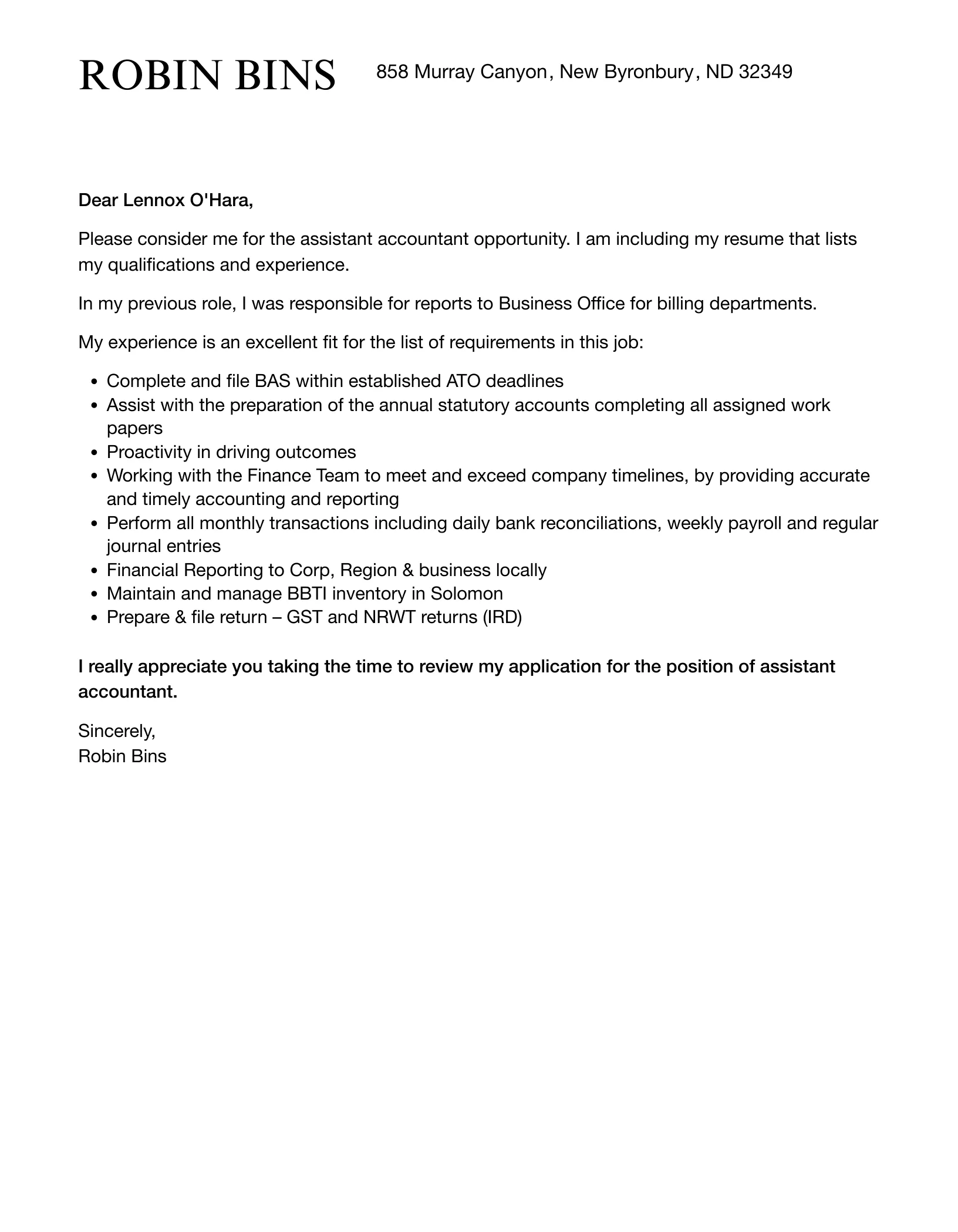Crafting a Cover Letter for Accountant Assistant
A well-crafted cover letter is your initial handshake with a potential employer. For an Accountant Assistant position, the cover letter serves as the initial introduction, and is a crucial component of your job application package. It is your chance to showcase your personality, enthusiasm for the role, and ability to communicate your qualifications effectively. It should go beyond simply restating your resume; it should tell a story that highlights your relevant skills, experience, and career aspirations. The goal is to persuade the hiring manager that you are a strong candidate and motivate them to review your resume in detail. The cover letter is your opportunity to distinguish yourself from other applicants and make a lasting impression, thus starting the application process on the right foot.
Key Skills to Highlight
When composing your Accountant Assistant cover letter, focusing on key skills is essential. Highlight both technical and soft skills relevant to the position. Technical skills to emphasize include proficiency in accounting software (such as QuickBooks, SAP, or Xero), knowledge of Generally Accepted Accounting Principles (GAAP), and experience with financial reporting and reconciliation. For example, demonstrate your ability to manage accounts payable and receivable, handle bank reconciliations, and prepare financial statements. In addition to technical skills, showcasing strong soft skills can set you apart from other candidates. These include excellent communication, both written and verbal, attention to detail, organizational skills, and the ability to work effectively in a team. Highlight your problem-solving abilities, time management skills, and your capability to manage multiple tasks simultaneously. Showing these skills will give hiring managers a comprehensive view of your capabilities.
Accounting Software Proficiency
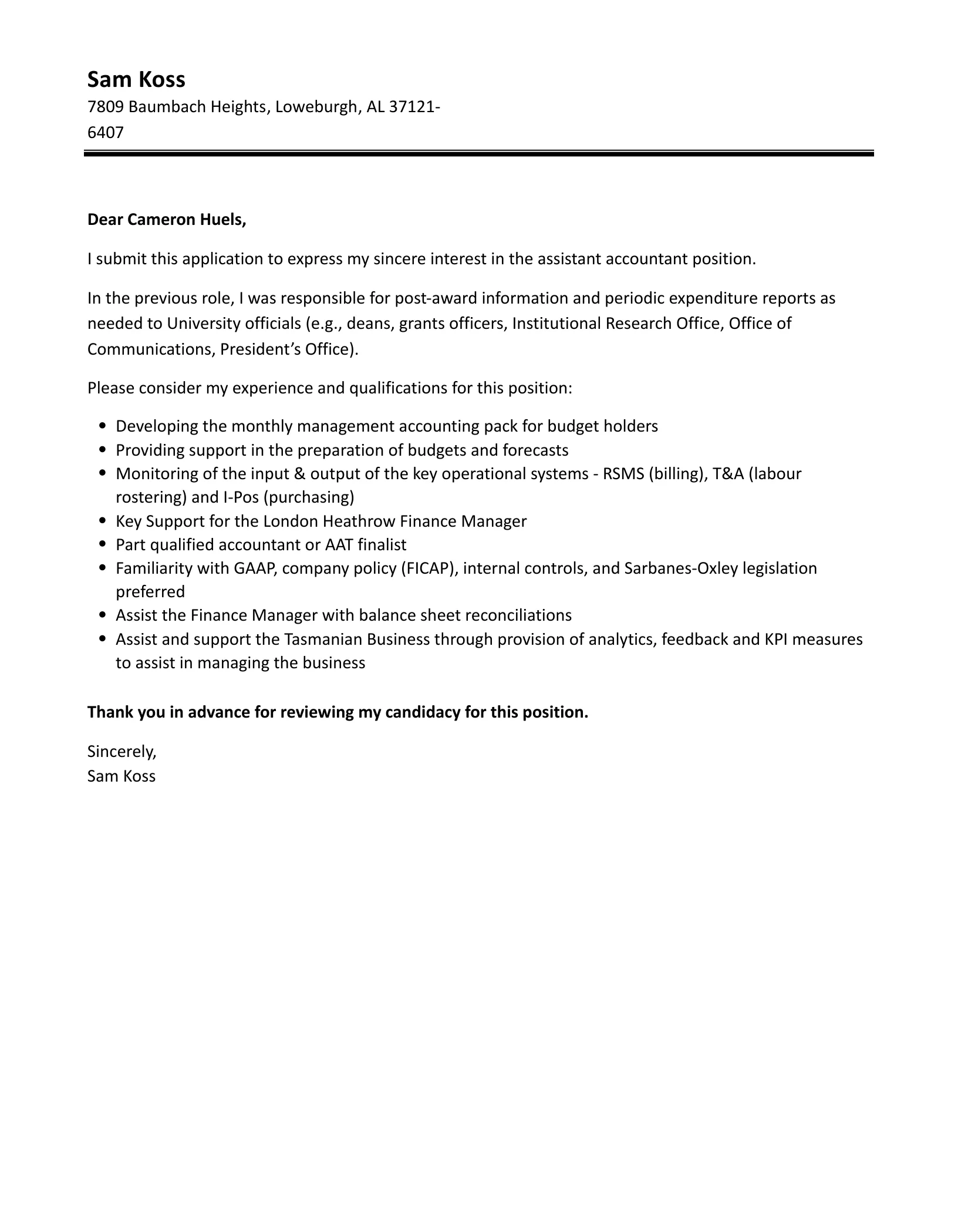
Proficiency in accounting software is a crucial skill for an Accountant Assistant. Mention specific software you are familiar with, such as QuickBooks, SAP, Oracle NetSuite, Xero, or others. Provide details about your experience using these tools. For instance, if you have experience with QuickBooks, mention your ability to perform tasks like entering invoices, managing customer accounts, and generating financial reports. If you have worked with SAP, describe your skills in areas like data entry, reconciliation, and reporting. Make sure to tailor your skills section to the specific requirements listed in the job description. This shows your experience is relevant to the role and you understand the company’s needs. Highlighting your software proficiency makes you a more desirable candidate and indicates your readiness to contribute effectively from day one.
Technical Skills and Experience
Your cover letter should provide details of your technical skills and practical experience relevant to the Accountant Assistant role. Include examples of how you have applied these skills in previous positions. If you have experience in accounts payable, describe your role in processing invoices, making payments, and reconciling vendor statements. Detail your involvement in accounts receivable, including tasks like generating invoices, following up on payments, and managing customer accounts. If you have experience with bank reconciliations, explain how you ensured accuracy and resolved any discrepancies. Mention your ability to prepare financial statements, such as income statements, balance sheets, and cash flow statements. Include any experience in budgeting, forecasting, and variance analysis. Emphasize any experience you have with tax preparation, auditing, or compliance. Make sure you clearly and concisely communicate the value you can bring to the company by highlighting your technical skills.
Formatting and Structure
The format and structure of your cover letter play an essential role in how the hiring manager perceives it. Start with your contact information, followed by the date, and the hiring manager’s name and title. Use a professional business letter format, ensuring your letter is easy to read and well-organized. Break your cover letter into clear sections. Begin with a concise opening paragraph that states the position you’re applying for and briefly summarizes your qualifications. Then, elaborate on your experience and skills in the subsequent paragraphs. Keep paragraphs brief and to the point to maintain reader engagement. Use bullet points to highlight key accomplishments and skills if appropriate. Always end with a strong closing paragraph expressing your interest in the position and providing a call to action. Proofread carefully and ensure your cover letter is free of grammatical errors or typos to enhance your credibility.
Essential Elements of a Cover Letter
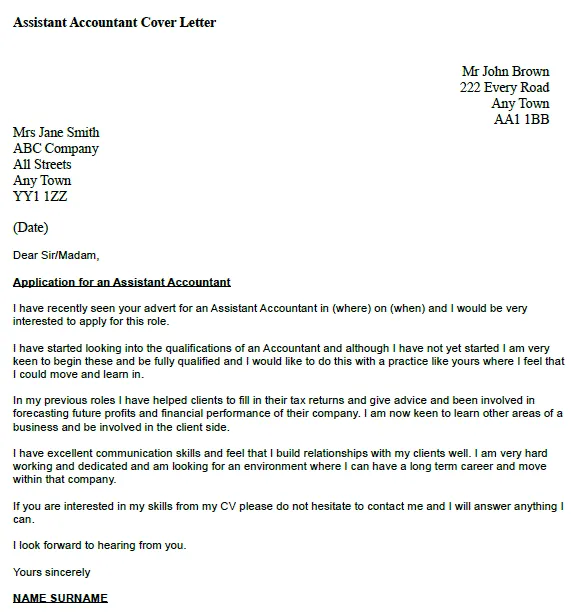
A compelling cover letter for an Accountant Assistant should include several key elements. Start with a personalized greeting, addressing the hiring manager by name if possible. The introduction should state the position you are applying for and briefly explain why you are a great fit. In the body paragraphs, highlight your most relevant skills and experience, providing specific examples of your achievements. For instance, if you have experience in accounts payable, detail your experience with processing invoices or reconciling vendor statements. If you have prepared financial statements, describe the process and results. Quantify your achievements whenever possible by using numbers and data to demonstrate your impact. For example, you could mention how you reduced processing time, improved accuracy, or streamlined a process. In the closing paragraph, reiterate your interest in the position and express your enthusiasm for the opportunity to contribute to the company’s success. Always include a call to action.
Contact Information
Your contact information is a must-have on your cover letter, ensuring the hiring manager can easily reach you. At the top of your cover letter, clearly list your full name, address, phone number, and email address. Make sure the email address is professional, preferably including your name. Double-check the accuracy of all contact details to avoid errors. Including your LinkedIn profile URL can also be beneficial as it provides the hiring manager with an instant link to your professional background, experience, and qualifications. By providing comprehensive and correct contact information, you make it easy for the employer to reach you and enhance the likelihood of progressing to the next stage of the hiring process.
Addressing the Hiring Manager
Addressing the hiring manager directly creates a more personalized impression and demonstrates your attention to detail. The best approach is to find out the name of the hiring manager and address the cover letter to them by name. You can often find this information on the job posting, the company website, or through LinkedIn. If you are unable to find a specific name, using a general salutation such as “Dear Hiring Manager” is acceptable. Avoid using generic salutations like “To Whom It May Concern,” as they do not create the same level of personal connection. If a name isn’t available, make sure you research the company and its culture to demonstrate your interest. This approach shows your commitment to the application process and allows you to create a more positive connection with the potential employer.
Highlighting Relevant Experience
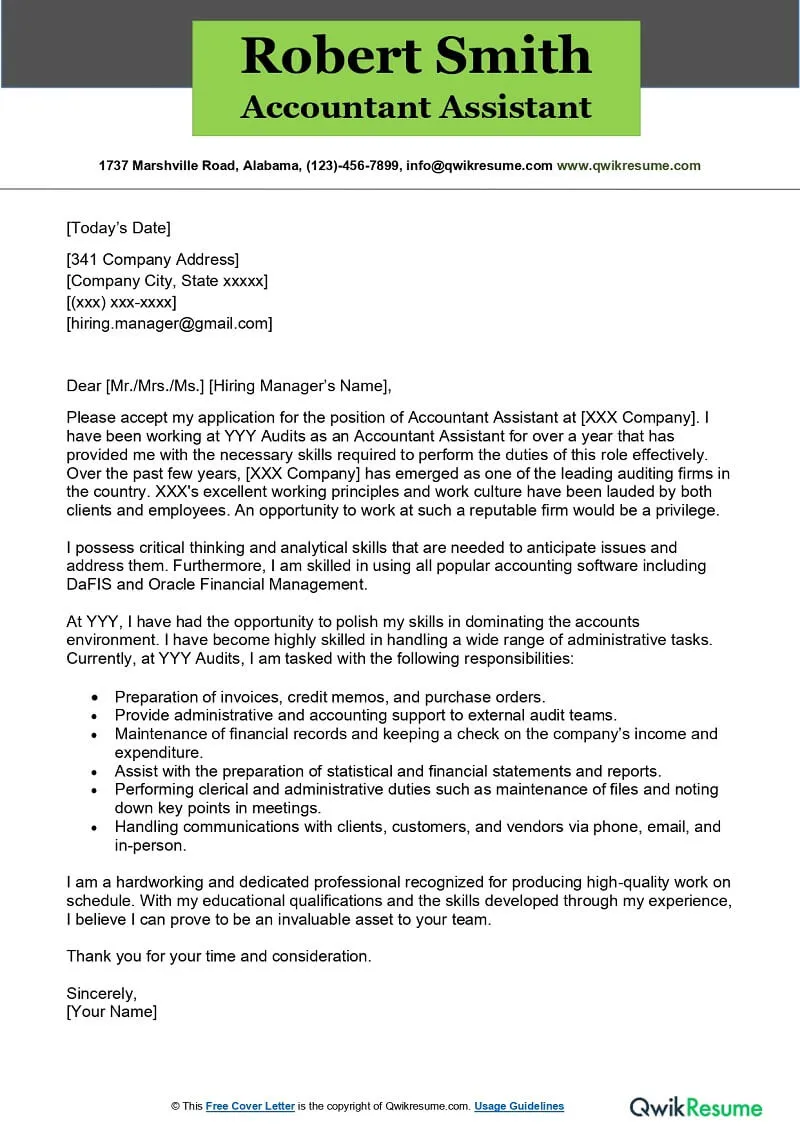
Highlighting your relevant experience is crucial for making a positive impression in your cover letter. Carefully review the job description and identify the key requirements and responsibilities of the Accountant Assistant role. Then, in your cover letter, provide specific examples of how your previous experience aligns with these requirements. Describe your involvement in tasks such as managing accounts payable and accounts receivable, performing bank reconciliations, and preparing financial statements. Whenever possible, use the STAR method (Situation, Task, Action, Result) to structure your examples. For instance, describe a situation you faced, the task you were assigned, the actions you took, and the positive results you achieved. This technique helps you to demonstrate your skills and contributions in a clear and compelling manner. Tailor your examples to the specific needs and expectations mentioned in the job description.
Quantifying Achievements
Quantifying your achievements is a highly effective strategy for making your cover letter stand out. Whenever possible, use numbers and data to illustrate the impact of your contributions. Instead of stating you “improved efficiency,” explain how you “reduced processing time by 15%.” Instead of saying you “managed accounts,” describe how you “successfully managed accounts payable for over 500 vendors.” Use data such as percentages, dollar amounts, or other relevant metrics to validate your accomplishments. These quantifiable results make your achievements more credible and demonstrate your value to the potential employer. By quantifying your successes, you clearly show the hiring manager the tangible benefits you brought to your previous roles, providing concrete evidence of your ability to perform well in the Accountant Assistant position.
Showcasing Soft Skills
While technical skills are essential, showcasing your soft skills can greatly enhance your cover letter. Highlight your communication, problem-solving, time management, and teamwork abilities. Give examples of how you have demonstrated these skills in past roles. For instance, describe a situation where you effectively communicated complex financial information to non-financial stakeholders. Or, highlight how you resolved a discrepancy in accounts payable, showing your problem-solving skills. Provide an example of how you managed multiple tasks and met deadlines to demonstrate your time management skills. Describe how you collaborated with a team to achieve a common goal, showcasing your teamwork abilities. By including these examples, you demonstrate to the hiring manager your ability to integrate well into the team and contribute effectively to the company’s success. Highlight soft skills to give the hiring manager a comprehensive view of your capabilities.
Proofreading and Editing
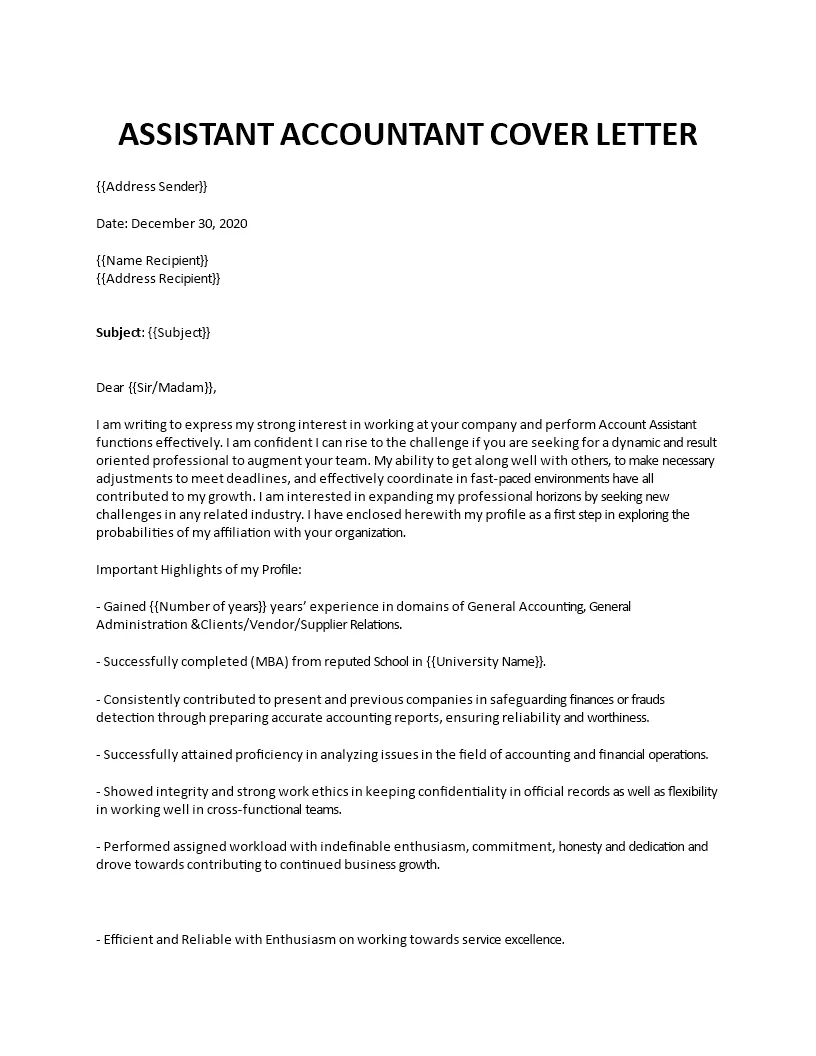
Proofreading and editing your cover letter is an essential step to ensure it presents you in the best possible light. Start by carefully reviewing your cover letter for any grammatical errors, spelling mistakes, and typos. Run your cover letter through a grammar and spell checker, but don’t rely solely on these tools; they often miss subtle errors. Read your cover letter out loud to identify awkward phrasing or sentences that are difficult to understand. Ask a friend, family member, or colleague to review your cover letter. A fresh pair of eyes can often catch errors that you might have missed. A polished, error-free cover letter demonstrates your attention to detail and professionalism, which is crucial in the accounting field. Make sure to review every detail before submitting your application.
Making a Strong First Impression
Your cover letter is your first opportunity to make an excellent impression on a potential employer. To achieve this, make sure it is well-written, concise, and tailored to the specific job and company. Highlight your relevant skills and experience, and use specific examples to demonstrate your achievements. Ensure your cover letter is free of errors and well-formatted. Tailor your cover letter to reflect the specific requirements and values of the company. Make sure to show your enthusiasm for the role and express your interest in the company. By following these guidelines, you’ll be able to create a cover letter that leaves a lasting positive impression and increases your chances of securing an interview for the Accountant Assistant position.
Tailoring Your Cover Letter
Tailoring your cover letter to each job application is a crucial step in the job search process. Avoid sending a generic cover letter; instead, customize it to match the specific requirements and values of each company and position. Start by carefully reviewing the job description and identifying the key skills and qualifications the employer is seeking. Then, in your cover letter, highlight your relevant experience and skills, and give examples of how you have used them in previous roles. Research the company and its culture to gain a better understanding of its mission, values, and goals. Use this knowledge to tailor your cover letter. You can address your experience and show your alignment with the company’s values and demonstrate why you are an ideal candidate. Highlighting these relevant points will make your cover letter more impactful and demonstrate your enthusiasm for the role and the company.
Researching the Company
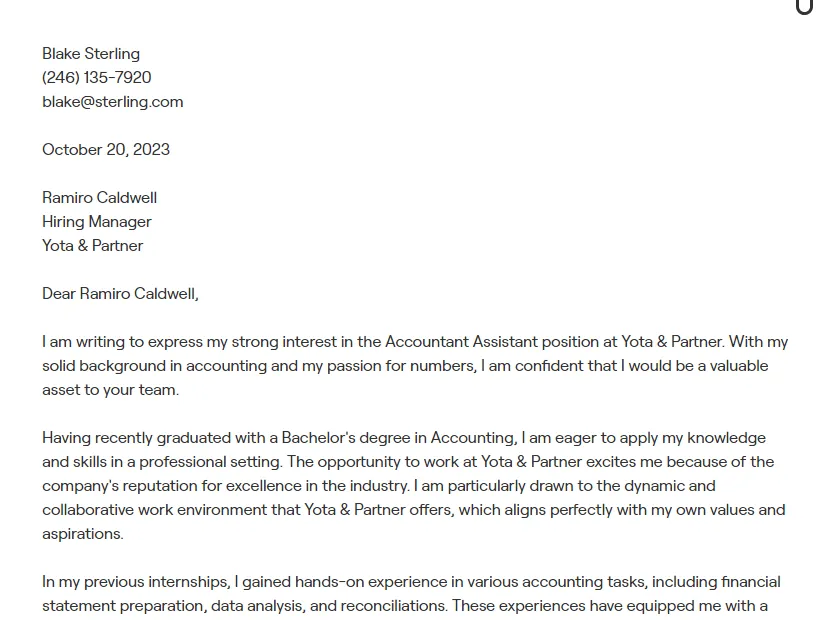
Researching the company is a very important step to writing a strong cover letter. Take the time to research the company before you apply. Visit the company’s website, read about its mission, vision, and values. Explore its products and services, and understand its position in the market. Check out the company’s LinkedIn profile and other social media platforms. Find out recent news articles or press releases about the company. Using this information, you can tailor your cover letter to the specific needs and goals of the company. Showing this understanding will impress the hiring manager and make your cover letter more effective. Demonstrate that you are genuinely interested in the company and understand its operations.
Aligning with Job Requirements
Aligning your cover letter with the job requirements is the most effective way to demonstrate your fit for the position. Carefully review the job description and highlight the key qualifications, skills, and experience the employer is looking for. Use these keywords and phrases in your cover letter to show your relevance. Provide specific examples of how your past experiences align with the job requirements. Show your skills and accomplishments related to the specific needs of the role. If the job description emphasizes experience with accounts payable, describe your experience in that area. If it highlights proficiency in a specific software program, mention your proficiency in it. Tailoring your cover letter will demonstrate that you have carefully read the job description and understand the requirements of the Accountant Assistant position. This increases the chances that the hiring manager will see your application as a strong match and invite you for an interview.
Call to Action
The call to action in your cover letter is your invitation to the hiring manager. It should be clear and concise, expressing your interest in the position and encouraging the hiring manager to take the next step. State your enthusiasm for the opportunity and restate your interest in an interview. Provide the hiring manager with a specific way to contact you, such as by phone or email. Thank the hiring manager for considering your application and let them know you are looking forward to hearing from them soon. A well-crafted call to action is a must-have to convince the hiring manager. This final step can significantly improve your chances of moving forward in the hiring process and will show your eagerness and determination to be the next Accountant Assistant.
Expressing Interest
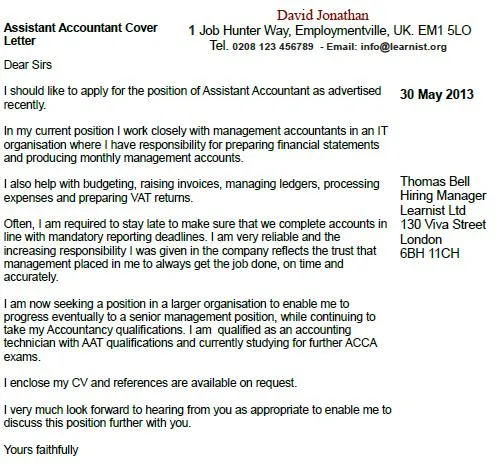
Expressing your interest in the Accountant Assistant position is a crucial part of your cover letter. After highlighting your skills and experience, clearly state your enthusiasm for the role. Mention why the company and the position appeal to you. Focus on aspects such as the company culture, its mission, or the specific responsibilities of the job. Show your genuine interest in the opportunity by expressing your excitement about the role and expressing your eagerness to contribute to the company’s success. This will make the hiring manager see your passion. Showing your enthusiasm and highlighting your interest in the company can make your cover letter more persuasive and increase your chances of getting an interview.
Next Steps
In the final paragraph of your cover letter, clearly outline the next steps you hope to take. Briefly reiterate your interest in the Accountant Assistant position. Then, express your willingness to discuss your qualifications in more detail during an interview. Include a call to action by providing your contact information. Thank the hiring manager for their time and consideration. By clearly indicating the next steps, you guide the hiring manager and make the application process as simple as possible for them. By providing a clear direction, you make the application process easier and show that you’re eager to move forward.
Following Up
Following up after submitting your cover letter and resume can show your interest in the role. After submitting your application, send a follow-up email to the hiring manager approximately one week after the application deadline or after you’ve heard nothing. In the email, briefly restate your interest in the position, and refer back to your application. If possible, mention a specific detail from your cover letter to show that you have carefully reviewed the job posting. Reiterate your interest in the position, and express your willingness to discuss your qualifications in more detail. Your email should be brief, professional, and polite. The follow-up shows your dedication. It also gives you a chance to clarify anything. By taking these steps, you show that you are professional and committed to securing the position.
Cover Letter Examples
Reviewing cover letter examples is an excellent way to understand the structure, style, and content of a successful cover letter. Search online for Accountant Assistant cover letter examples to find samples that match your experience and the job you are applying for. Use these samples as a guide to get ideas for your own cover letter. Analyze different examples to understand how candidates highlight their skills, experience, and achievements. Pay attention to the language and tone used in these samples, and adapt them to your personality. Remember that your cover letter should be unique and reflect your own strengths and qualifications. By studying cover letter examples, you can improve the quality of your cover letter and increase your chances of securing an interview.
